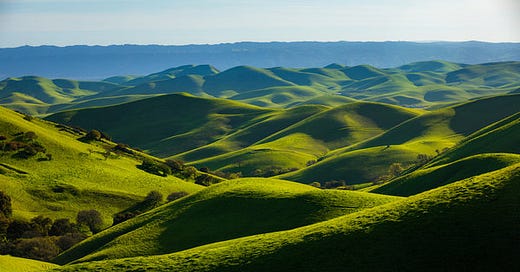In her book, Hope in the Dark, author Rebecca Solnit argues that humans have been expecting the end of the world for many centuries, and yet it still hasn’t happened. She doesn’t bother with the argument that it won’t happen, she just makes the argument that it’s unlikely, so we could use our time more effectively if we focused on being part of changing the world rather than simply giving up on it.
Some days, it's hard to imagine the world will become a better place though, isn’t it? And it’s hard to find our place in making any kind of change too. Some people are quite focused: the innovators, inventors, the political activists. I recently watched a piece on 60 Minutes about Badiucao, a Chinese political artist, a dissident living in exile, and he referenced “Tank Man.” They showed a video while he was talking. I don’t think I had never seen Tank Man before; I didn’t remember him. He stood in front of a line of 59 tanks leaving Tiananmen Square in 1989, the day after the military gunned down non-violent civilian protestors. The tank in front kept trying to move around Tank Man, and he kept getting in front of it. I cried watching him, because I know he was later arrested for such an act of defiance, or insolence. He was imprisoned, possibly killed, but he couldn’t tolerate the place he lived anymore, he couldn’t tolerate what was happening in his world. I cried because I don’t have that kind of courage. And I cried because I’m not sure if he really made a difference.
And how could the world come to an end? I think about this on days when I have walked in the sun, the ocean or the bay by my side, the pelicans flying above me in that perfect V formation, the trees providing shade and safe branches for the tiniest of finches with bright red heads, the fog burying the top half of the Golden Gate Bridge, the bottom awash in sunlight, like a watercolor, like those reprinted vintage postcards I hope they still sell at Fisherman’s Wharf, but doubt that they do. How could the apocalypse happen when there are young people like Greta Thunberg and Boyan Slat, and older people like Jane Goodall and David Attenborough, who are working so hard to wake us up and to keep us awake, not just to the problems, the endangered, the extinctions, the lives out of balance, but also the options, the strategies, the knowledge, the adaptation, the possibility for change? I still believe humans are capable of anything: that includes self-destruction as well as saving the planet.
I admit, it doesn’t look good, but did it ever? And how can we move forward at all, and decide how we are going to participate, if we throw up our hands in defeat? I’m not telling you what to do, I’m really not. I just know that I can’t live that way. I have to believe that there’s still a solid chance.
___________________________________________
The writing prompt that inspired this post was this poem by Lisa Mueller, from her collection, Alive Together:
Hope
It hovers in dark corners
before the lights are turned on,
it shakes sleep from its eyes
and drops from mushroom gills,
it explodes in the starry heads
of dandelions turned sages,
it sticks to the wings of green angels
that sail from the tops of maples.
It sprouts in each occluded eye
of the many-eyed potato,
it lives in each earthworm segment
surviving cruelty,
it is the motion that runs
from the eyes to the tail of a dog,
it is the mouth that inflates the lungs
of the child that has just been born.
It is the singular gift
we cannot destroy in ourselves,
the argument that refutes death,
the genius that invents the future,
all we know of God.
It is the serum which makes us swear
not to betray one another;
it is in this poem, trying to speak.




